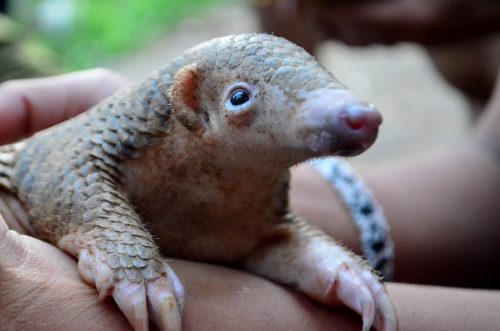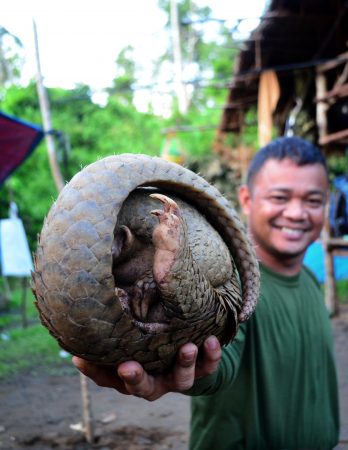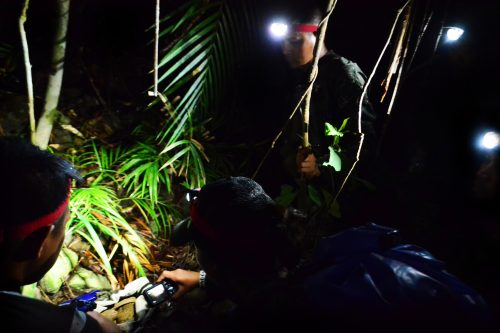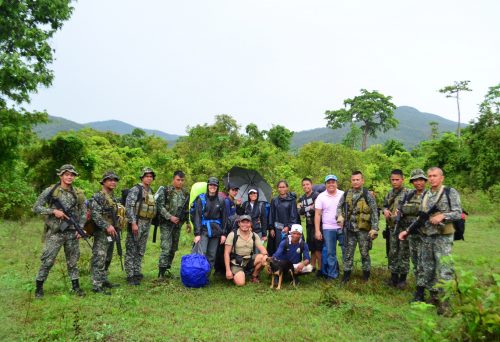“It’s easier to find rebels in these mountains than pangolins,” grunted a sergeant from the Philippine Marine Corps.

Battle-hardened Marines from the 3rd Brigade joined researchers to find pangolins in the dense, rattan-tangled jungles of southern Palawan last month. Pangolins are scaly mammals which slurp ants and termites with their sticky tongues. Caught for traditional Chinese medicine and dubbed as most illegally-trafficked mammals on Earth, they’ve become global icons of how animals face extinction via the illegal wildlife trade.
TRAFFIC estimates that around a million pangolins have been traded through 67 countries in the past decade, prompting a global ban often skirted by smuggling rings.

The belief that pangolin scales – in reality made of keratin (the same material as hair and nails) – has mystical powers, dates back centuries. “No one pays for powdered fingernails, but traditional Chinese medicine believers spend a fortune for powdered pangolin scales, which are no different,” says Dr. Sabine Schoppe, an expert on the Philippine pangolin. “Legal prescribed medicines are cheaper and more efficient alternatives. It’s time to leave old traditions behind and opt for more sustainable solutions.”
Due largely to poaching, the population of the Philippine pangolin (Manis culionensis) has plummeted as much as 95% since the 1980s, locally making it critically-endangered – one step above extinction.

“The illegal wildlife trade is run by organized syndicates with their own systems for capturing and smuggling pangolins, so we must tighten security,” explains Atty. Edward Lorenzo, USAID’s Protect Wildlife crime prevention advisor. TRAFFIC records 667 Philippine pangolins apprehended by authorities from 2001 to 2017, with 10 live animals recovered at a checkpoint in Tagaytay City just last June.
Some of the recovered animals came from other countries. In April 2013, a Chinese poaching vessel rammed into the Philippines’ famed Tubbataha Reefs. Found aboard were 2870 dead pangolins.
“DNA tests conducted on the pangolins confiscated off Tubbataha in 2013 revealed they came not just from Palawan, but Cambodia, Indonesia, Malaysia and Vietnam. This proves that illegal traders source their contraband from all over Southeast Asia,” explains Dr. Mundita Lim, executive director of the Asean Center for Biodiversity. “Efforts to combat the trade cannot be undertaken separately, at a country by country level, but through coordinated action at the regional level.”
Tens of thousands of pangolins are also caught in Africa, where four of the eight pangolin species live. Last April, 25 tons of scales from an estimated 38,000 African pangolins were confiscated in Singapore, the largest haul in history.
USAID’s Protect Wildlife Project is working closely with the Palawan Council for Sustainable Development and Katala Foundation to assess pangolin numbers in mainland Palawan. It is funding a dozen ground surveys, each covering 200 hectares. Thirty five camera traps to catalogue wildlife have also been deployed.

So far, the ground survey team has found only two pangolins for 2019 – attesting to their rarity and secretive nature. Pangolins spend most days quietly hiding in earthen burrows, rotting stumps or high in trees, emerging only at night to feed.
The Marines, some of who are Marawi veterans, embraced the idea of helping save wildlife. “The researchers spent six months just to find two pangolins,” notes Sgt. Darwin Balutan, who served in Jolo and Basilan. “It seems there aren’t many left.”
Environmentalist Gregg Yan from Best Alternatives joined the expedition to interview the troops, who vowed to protect Palawan’s pangolins. “We’re often in the jungle, but it’s our first time to notice how much wildlife there is in the Philippines,” says Sgt. Norman Pintor. “The conservation community can count on us. We’re proud to serve our country whatever way possible.”

